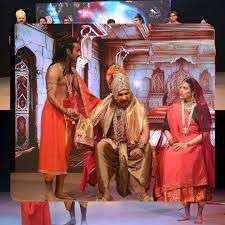
Ramayana triumphs in Karachi: A tale of tolerance, technology, and timeless glory
Karachi, Pakistan — In a moment that defies borders, faith, and expectations, the Hindu epic Ramayana was staged for the first time in Pakistan, earning widespread acclaim and sparking conversations about cultural openness in a country often viewed through the lens of religious conservatism. The production, led by the Karachi-based theatre group Mauj Collective, unfolded at the Karachi Arts Council on July 11. Directed by Yogeshwar Karera—a Sindhi Hindu and finance graduate turned theatre visionary—the play blended traditional storytelling with cutting-edge AI technology, creating a visually immersive experience that captivated audiences across generations.
Directed by Yogeshwar Karera—a Sindhi Hindu and finance graduate turned theatre visionary—the play blended traditional storytelling with cutting-edge AI technology, creating a visually immersive experience that captivated audiences across generations.
A Bold Cultural Milestone
The staging of Ramayana—a revered Indian epic chronicling the triumph of good over evil—marked a historic first in Pakistan. Despite ongoing Indo-Pak tensions, the show sold nearly 1,000 tickets, drawing families, students, and elders from diverse backgrounds. Karera, the only Hindu in an otherwise all-Muslim cast, said he never feared backlash. “To me, bringing the Ramayana to life on stage is a visual treat and shows Pakistani society is more tolerant than it is often given credit for,” he told reporters.
Karera, the only Hindu in an otherwise all-Muslim cast, said he never feared backlash. “To me, bringing the Ramayana to life on stage is a visual treat and shows Pakistani society is more tolerant than it is often given credit for,” he told reporters.
Tradition Meets Technology
The production used AI-enhanced visuals to modernize the ancient tale, appealing especially to younger audiences. From dynamic lighting and live music to vibrant costumes and evocative set design, critics praised the show’s authenticity and innovation.
Art critic Omair Alavi called the narrative “top class,” noting that Ramayana resonates with millions across the subcontinent. Actress Raana Kazmi, who portrayed Sita, described the experience as “transformative,” saying it brought the epic to life in a way that felt both ancient and immediate.
A Story That Belongs to All
The cast and crew emphasized that Ramayana is not just a Hindu story—it’s a shared cultural treasure of South Asia. Actor Ashmal Lalwany, who played Ram, said, “The epic belongs to the whole subcontinent,” underscoring its universal themes of duty, sacrifice, and righteousness.
To make the story more accessible, the team adapted some Sanskrit and Hindi terms to local vernacular—like replacing prakriti with kudrat—which led to humorous moments during rehearsals but helped bridge linguistic gaps.
A Message Beyond the Stage
While Mauj Collective insists the play wasn’t intended as a political statement, its impact is undeniable. In a country where religious minorities often face scrutiny, the successful staging of Ramayana stands as a symbol of artistic courage and cultural unity.
As Karera put it, “We weren’t trying to make a statement. We just wanted to tell a story that’s been part of our lives since childhood. And the response shows that stories like Ramayana can bring people together—even in places where you least expect it.”
IndoUS Tribune Applauds the Effort
In a gesture of solidarity and admiration, the IndoUS Tribune extended its heartfelt congratulations to the entire Ramayana team.
“In showcasing the epic of Ramayana on Pakistani soil, the Mauj Collective has achieved more than theatrical excellence—they’ve elevated the discourse on cross-cultural harmony and artistic boldness. We salute the cast, crew, and visionary direction that made this performance possible.”